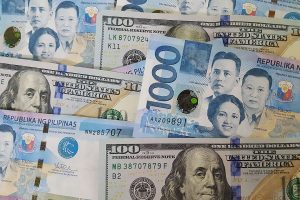




Philippines Trade Update: Imports weaken on tepid demand
 DOWNLOAD
DOWNLOAD

Policy Rate Updates: BSP outlook — cloudy with a chance of rate cut
 DOWNLOAD
DOWNLOAD

January Economic Update: Growth slows, prices rise
 DOWNLOAD
DOWNLOAD


Peso slips vs the dollar on possible yen intervention

The peso slipped against the dollar on Monday to track the sideways movement among regional currencies led by the yen amid signals of more proactive intervention from Japanese Prime Minister Sanae Takaichi’s administration.
The local unit closed at PHP 58.87 per dollar, inching down by 1.5 centavos from its PHP 58.855 finish on Friday, Bankers Association of the Philippines data showed.
The peso opened the session slightly stronger at PHP 58.83 against the greenback, which was also its intraday best. Its worst showing was at PHP 59.02 versus the dollar.
Dollars traded fell to USD 1.17 billion on Monday from USD 1.68 billion on Friday.
The peso followed the yen’s range-bound movement amid signals of foreign exchange intervention from the Japanese government, Rizal Commercial Banking Corp. Chief Economist Michael L. Ricafort said in a Viber message.
“The dollar-peso traded sideways but closed a bit higher on lack of fresh catalysts,” a trader said in a phone interview.
For Tuesday, the trader sees the peso moving between PHP 58.80 and PHP 59.10 per dollar, while Mr. Ricafort expects it to range from PHP 58.75 to PHP 59.
The dollar was steady and traders wary on Monday as intervention risks swirled around the yen, Reuters reported.
A holiday in Tokyo lightened trade in the Asia day and left the yen on hold at JPY 156.53 per dollar.
Japan’s currency has been sliding on a combination of its low interest rates and looser fiscal policies, but it bounced from 10-month lows late last week when Finance Minister Satsuki Katayama ramped up verbal warnings of official yen buying.
Traders see intervention looming somewhere between JPY 158 and JPY 162 per dollar, with Thanksgiving-thinned trade later in the week a possible window for authorities to step in.
“We do not rule out a move as early as Friday, London/New York hours, ahead of ¥160 and if it happens the move lower can be sharp especially if liquidity is thin,” said OCBC strategists Frances Cheung and Christopher Wong in a note.
Japan can actively intervene in the currency market to mitigate the negative economic impact of a weak yen, Takuji Aida, a private sector member of a key government panel, said in a television program on NHK on Sunday. — A.M.C. Sy with Reuters
This article originally appeared on bworldonline.com





 By BusinessWorld
By BusinessWorld